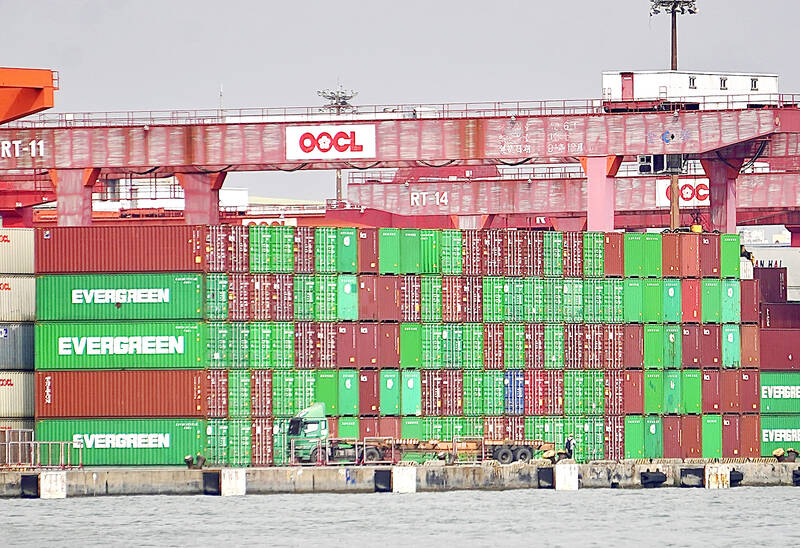Exports last month increased a modest 3.5 percent year-on-year to US$37.36 billion, as shipments of electronics used in artificial intelligence (AI) remained strong and some non-tech products came out of the woods, the Ministry of Finance said yesterday.
The increase lagged behind the 7 to 10 percent range the ministry expected, as firms at home and abroad largely maintained a cautious business approach, but their inventory mostly returned to healthy levels and the global economy is improving, Department of Statistics Director-General Beatrice Tsai (蔡美娜) said.
There is a lingering uneven recovery between product categories and export destinations — with exports of information and communication technology (ICT) products to the US driving most of the growth, helped by aggressive spending of US technology giants on AI infrastructure, she said.

Photo: CNA
The megatrend explained why ICT shipments such as AI servers and graphics cards surged 62.4 percent to US$9.42 billion, underpinning 25.2 percent of overall shipments, Tsai said.
Meanwhile, exports of electronics, mainly chips, shed 11 percent to US$13.4 billion, she said, adding that the retreat in electronics likely had to do with the reclassification of partial exports as imports to reflect changes in manufacturing locations.
It is better to combine electronics and ICT shipments to gain a better picture, as the two categories made up 64 percent of total exports and made a solid gain in the first five months of this year, she said.
Taiwan Semiconductor Manufacturing Co’s (TSMC, 台積電) robust revenue lent support to such an interpretation, Tsai said.
TSMC yesterday posted NT$229.62 billion (US$7.12 billion) of revenue for last month, a 30.2 percent spike from a year earlier.
Shipments of optical and precision products plunged 31.2 percent to US$892 million, while exports of transportation tools shrank 25 percent to US$880 million, the ministry’s report showed.
On the other hand, some non-tech products emerged from a slowdown, as customers started to rebuild inventory, Tsai said.
Exports of plastic grew 0.6 percent, while chemical and mineral products saw a growth 8.9 percent, the ministry said.
Shipments of textile products bounced 10.2 percent, given the demand for sportswear for the upcoming Olympic Games, she said.
Imports increased 0.6 percent to US$31.31 billion, giving Taiwan a trade surplus of US$6.05 billion, which is 21.6 percent higher than a year earlier, the ministry said.
Imports of agricultural and industrial raw materials picked up 5.8 percent, while imports of semiconductor equipment and luxury products declined 11.4 percent and 10.7 percent each, it said.
In the first five months, exports expanded 9.1 percent to US$185.14 billion and imports rose 3.2 percent to US$153.69 billion, it said.

When an apartment comes up for rent in Germany’s big cities, hundreds of prospective tenants often queue down the street to view it, but the acute shortage of affordable housing is getting scant attention ahead of today’s snap general election. “Housing is one of the main problems for people, but nobody talks about it, nobody takes it seriously,” said Andreas Ibel, president of Build Europe, an association representing housing developers. Migration and the sluggish economy top the list of voters’ concerns, but analysts say housing policy fails to break through as returns on investment take time to register, making the

NOT TO WORRY: Some people are concerned funds might continue moving out of the country, but the central bank said financial account outflows are not unusual in Taiwan Taiwan’s outbound investments hit a new high last year due to investments made by contract chipmaker Taiwan Semiconductor Manufacturing Co (TSMC, 台積電) and other major manufacturers to boost global expansion, the central bank said on Thursday. The net increase in outbound investments last year reached a record US$21.05 billion, while the net increase in outbound investments by Taiwanese residents reached a record US$31.98 billion, central bank data showed. Chen Fei-wen (陳斐紋), deputy director of the central bank’s Department of Economic Research, said the increase was largely due to TSMC’s efforts to expand production in the US and Japan. Investments by Vanguard International

WARNING SHOT: The US president has threatened to impose 25 percent tariffs on all imported vehicles, and similar or higher duties on pharmaceuticals and semiconductors US President Donald Trump on Wednesday suggested that a trade deal with China was “possible” — a key target in the US leader’s tariffs policy. The US in 2020 had already agreed to “a great trade deal with China” and a new deal was “possible,” Trump said. Trump said he expected Chinese President Xi Jinping (習近平) to visit the US, without giving a timeline for his trip. Trump also said that he was talking to China about TikTok, as the US seeks to broker a sale of the popular app owned by Chinese firm ByteDance Ltd (字節跳動). Trump last week said that he had

STRUGGLING TO SURVIVE: The group is proposing a consortium of investors, with Tesla as the largest backer, and possibly a minority investment by Hon Hai Precision Nissan Motor Co shares jumped after the Financial Times reported that a high-level Japanese group has drawn up plans to seek investment from Elon Musk’s Tesla Inc to aid the struggling automaker. The group believes the electric vehicle (EV) maker is interested in acquiring Nissan’s plants in the US, the newspaper reported, citing people it did not identify. The proposal envisions a consortium of investors, with Tesla as the largest backer, but also includes the possibility of a minority investment by Hon Hai Precision Industry Co (鴻海精密) to prevent a full takeover by the Apple supplier, the report said. The group is